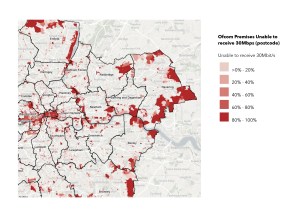[ad_1]
Press Launch
Over 150,000 premises in south and east London wouldn’t have entry to excessive velocity – Gigabit succesful – web connections
Opposite to notion, a whole bunch of hundreds of addresses in London are affected by sluggish digital connectivity, inflicting digital inequalities that impede the lives of individuals and companies.
The ‘Sub-regional Digital Infrastructure Technique’ launched as we speak by Native London and the South London Partnership, identifies gaps in 14 south and east London boroughs. It consists of suggestions for driving up the standard and accessibility of providers in them and can assist channel funding to areas of financial alternative.
There are over 103,000 premises in Native London and 53,000 South London Partnership unable to acquire a Gigabit succesful broadband service with many sitting in a ‘not spot,’ unable to obtain even a 30 Mbps service.

Mapping out the digitally poor postcodes, the technique highlights finest practices, studying and actions that the private and non-private sector can take collectively to construct world-leading digital infrastructure for a few of the quickest rising components of London.
Commissioned by the Mayor of London’s Infrastructure Coordination Service, the ‘Sub-regional Digital Infrastructure Technique’ is a part of a wider pilot which can ship an interactive mapping device and an on-line digital toolkit that can help borough officers to ship digital infrastructure to their websites and leverage extra industrial digital infrastructure funding within the sub-regions.
The ‘Sub-regional Digital Infrastructure Technique’ offers a compelling argument for actively pursuing digital funding together with step-by-step steering to public sector officers to draw funding and promote higher high quality and extra accessible providers, together with:
- Map and statistics illustrating clearly the place poor digital infrastructure points lie.
- Suggestions for public sector resourcing and roles, trade engagement, procurement choices and industrial fashions, and key elements of a profitable supply technique.
- Case research and examples from throughout the UK demonstrating profitable methods of working and advantages gained.
- The strategic, industrial, monetary, administration case and choices evaluation.

Theo Blackwell MBE, Chief Digital Officer, Better London Authority stated “Broadly out there, simply accessible digital connectivity is important for individuals to achieve public providers and is essential to serving to cities develop by driving innovation and the creation of latest companies.
“But there are nonetheless components of London that undergo from a scarcity of business funding in digital infrastructure, and this leads to gaps in web protection or ‘not spots’.
“We should handle these gaps and drive the up the standard and accessibility of the providers which are already out there, to assist the capital to be a fairer, extra affluent, and extra equal London for everybody.”
Cllr Baroness O’Neill of Bexley OBE, Chairman of Native London and Chief of London Borough of Bexley stated “We’re delighted to launch the ‘Sub-regional Digital Infrastructure Technique’ with our colleagues at South London Partnership. This offers step-by-step steering to public sector colleagues for unlocking inward funding and maximising present infrastructure to profit individuals and companies within the space. Together with the database and digital toolkit, this pilot method will assist all 14 boroughs deal with the digital divide, while additionally making a legacy of studying which have even wider advantages.”
Cllr Gareth Roberts, Chair, South London Partnership and Chief of London Borough of Richmond upon Thames Council commented “This joint technique demonstrates the advantages of a cross-boundary method. Addressing the problems at a sub-regional stage, with colleagues at Native London, this technique offers clear steering for unlocking fast deployment of subsequent technology wi-fi infrastructure and gigabit succesful full fibre, to align us with different city areas within the UK, while responding to the distinct social and financial wants of every borough.”
[ad_2]
